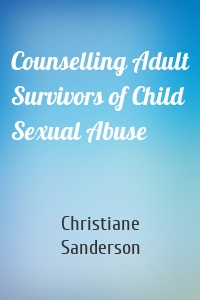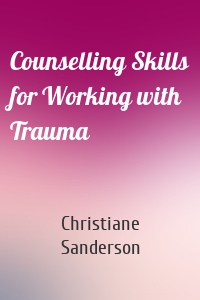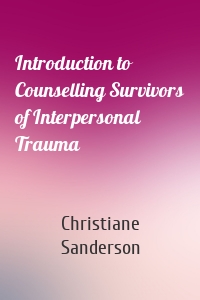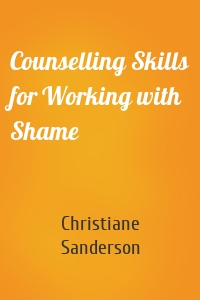Christiane Sanderson
5 кн.
The Seduction of Children
This highly accessible and informative book offers practical strategies for the protection of children that all parents, teachers, and anyone involved in the life of a child will find indispensable. Providing the reader with an understanding of typical/normative sexual development in children, Christiane Sanderson enables parents and teachers to distinguish this from atypical sexual development and recognize the warning signs of sexual abuse. The more knowledgeable and comfortable teachers and...
| Автор | Christiane Sanderson |
Counselling Adult Survivors of Chil...
This updated and expanded edition provides comprehensive coverage of the theory and practice of counselling survivors of child sexual abuse (CSA). In a reasoned and thoughtful approach, common stereotypes of abusers and their victims are replaced with current knowledge on the incidence of CSA and its long-term impacts on adult survivors. Christiane Sanderson explores the therapeutic relationship from building trust and meeting the client's needs to establishing boundaries, addressing...
| Автор | Christiane Sanderson |
Counselling Skills for Working with...
Counselling Skills for Working with Trauma is a practical, introductory guide to counselling survivors of child abuse, neglect, rape, sexual violence, sexual trafficking, religious sexual abuse, and domestic abuse. Written in an accessible style, it provides a comprehensive introduction to complex trauma accompanied by advice on how to create a safe environment in which survivors can learn the skills to restore control over trauma symptoms, to aid healing and post traumatic growth. The book...
| Автор | Christiane Sanderson |
Introduction to Counselling Survivo...
Victims of sexual and physical trauma can feel lost and disconnected from themselves and others. Christiane Sanderson's new book explains how counsellors can restore connection to self and others, and facilitate recovery within a safe and supportive therapeutic relationship. To understand fully the harm caused by interpersonal trauma, professionals must first recognize its complex nature, and the psychological and emotional impact of exposure to control and terror. This book examines the...
| Автор | Christiane Sanderson |
Counselling Skills for Working with...
Counselling Skills for Working with Shame helps professionals to understand and identify shame and to build shame resilience in both the client and themselves. Shame is ubiquitous in counselling where there is an increased vulnerability and risk of exposure to shame. While many clients experience feelings of shame, it is often overlooked in the therapeutic process and as a result can be left untreated. It is particularly pertinent when working with clients who have experienced trauma, domestic...
| Автор | Christiane Sanderson |






